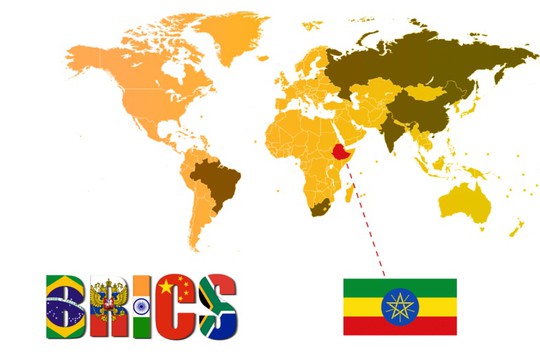The global geopolitical scene is experiencing a new strategic movement with the official entry of Ethiopia into the BRICS group (pic.). This accession, effective recently, marks a turning point in the dynamics of international relations, particularly between emerging and developing countries, writes ‘La Nouvelle Tribune’ from Benin.
The BRICS club, initially made up of Brazil, Russia, India, China and South Africa, has expanded to welcome new members, including Ethiopia. This expansion demonstrates the growing appeal of this alliance for nations seeking to diversify their economic and diplomatic partnerships. Egypt, Saudi Arabia, the United Arab Emirates and Iran also joined the ranks, while Argentina, initially approached, ultimately declined the invitation following a change of political course.
In this context of reconfiguring alliances, Ethiopia stands out for its enthusiasm to strengthen its ties with Russia. Like a young shoot seeking to take root in fertile soil, Addis Ababa sees Moscow as a partner of choice to stimulate its growth within the BRICS.
The President of the Federation Council of the Ethiopian Parliament, Agegnehu Teshager underlined his country's desire to actively develop economic relations within the group, with particular interest in strengthening the BRICS bank. This financial institution could become fertile ground for increased economic cooperation between members.
Ethiopia does not just want to benefit from this new alliance; she seeks to make her contribution. The Blue Nile country sees in BRICS a potential for transforming global economic relations. This vision is part of a broader criticism of traditional international financial institutions, perceived by certain African countries as instruments of Western oppression.
Ethiopia’s gratitude to Russia is palpable. Teshager recalled Moscow's crucial support for his country's BRICS membership, highlighting a history of cooperation that extends well beyond this recent event. This mutual recognition could be the catalyst for even closer collaboration in the future.
Ethiopian enthusiasm is not limited to political circles. Teshager spoke of the joy of Ethiopia's youth and people over the re-election of Russian President Vladimir Putin, illustrating a sympathy that goes beyond formal diplomatic relations.
In conclusion, Ethiopia's accession to BRICS and its stated desire to strengthen its ties with Russia mark a significant step in the evolution of international relations. This rapprochement could not only redefine Africa's place on the world stage, but also influence the very nature of the BRICS. As the group expands, it remains to be seen how it will reconcile the diverse interests of its members while maintaining its cohesion and influence on the international stage.
read more in our Telegram-channel https://t.me/The_International_Affairs

 12:04 22.07.2024 •
12:04 22.07.2024 •























